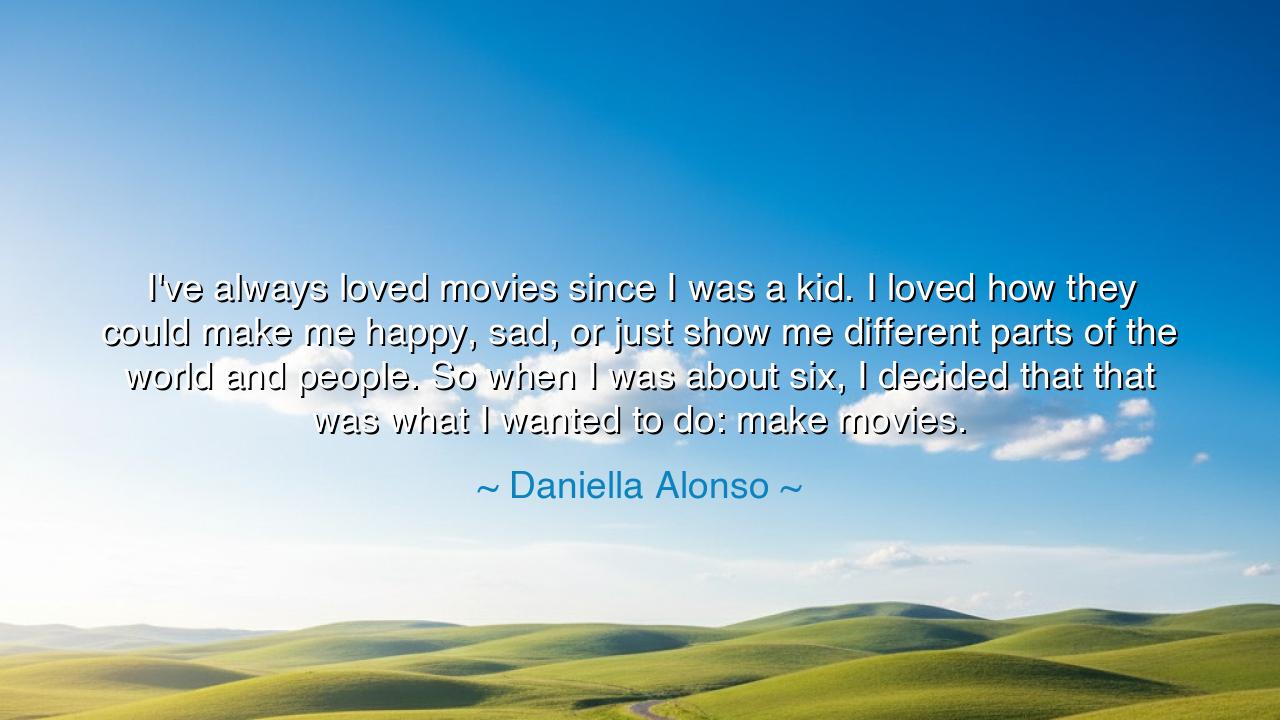
I've always loved movies since I was a kid. I loved how they
I've always loved movies since I was a kid. I loved how they could make me happy, sad, or just show me different parts of the world and people. So when I was about six, I decided that that was what I wanted to do: make movies.






Daniella Alonso, with the heart of both dreamer and storyteller, once declared: “I’ve always loved movies since I was a kid. I loved how they could make me happy, sad, or just show me different parts of the world and people. So when I was about six, I decided that that was what I wanted to do: make movies.” In these words lies the sacred awakening of purpose. For when a child discovers not only delight in the world but also a calling within it, the seeds of destiny are sown. Alonso speaks not only of cinema, but of the power of art itself—the power to awaken joy, stir sorrow, and reveal the hidden diversity of humankind.
The origin of her passion lies in the universal experience of childhood wonder. The screen became for her not a mere diversion, but a window to worlds beyond her reach, to emotions larger than her own life, and to people she might never otherwise meet. Movies were both teacher and companion, shaping her heart with their rhythms of laughter and grief. At six years old, she did what few dare: she declared her dream, binding herself to the path of creation. This is the first lesson—when the soul recognizes its calling, even in childhood, it speaks with a clarity that time cannot erase.
Throughout history, we see the same pattern in the lives of visionaries. Consider Steven Spielberg, who as a boy borrowed his father’s film camera to shoot his own tiny epics. What began as childhood play became the foundation of a career that would change cinema itself. Like Alonso, he was moved by the magic of storytelling and resolved to create his own. The story of every great artist begins with this same moment of recognition: the transformation of wonder into purpose.
Or recall Mozart, who, as a child of three, leaned into the harpsichord with fingers too small for the keys, yet already possessed by music. His father marveled as the boy composed melodies long before he knew the weight of words. Mozart’s gift, like Alonso’s, was discovered early, nurtured by passion, and carried into a life of creation. These stories teach us that when a calling awakens in youth, it is often the truest echo of what the soul was made for.
The deeper meaning of Alonso’s words is this: art is not merely entertainment—it is a force that shapes human understanding. A film that makes one laugh in sorrow, weep in joy, or glimpse another culture is more than a pastime; it is a bridge between hearts, a mirror of the human condition. When Alonso loved movies for their ability to make her happy or sad, she was recognizing the essential power of art: to move the spirit, to bind us together through shared feeling, and to reveal the beauty and brokenness of the world.
The lesson for us is clear: listen to the stirrings of your own heart, especially those planted in childhood. Do not dismiss them as folly, for they may be the truest voice of destiny. If, like Alonso, you were once moved by a story, a song, or a vision so deeply that you longed to create it yourself, do not abandon that spark. For the world is shaped not only by those who govern or fight, but by those who tell its stories and stir its emotions.
Practical wisdom follows: nurture your passions. Watch closely what stirs your soul—whether it be films, music, science, or service. Give time to these loves, for in them lies the possibility of a calling. And if you are far from childhood, look back and remember: what did you once dream of at six, at ten, at twelve? That seed may still be waiting, ready to bear fruit if you choose to water it.
Thus Daniella Alonso’s words endure not merely as a memory of a child in wonder, but as a teaching for all generations: the things that move us most deeply are often the things we were born to create. Movies taught her to feel, and so she resolved to make movies that others might feel too. Let us, then, heed the same truth—seek the art that awakens us, and dare to create, so that future hearts may be lifted as ours once were.






AAdministratorAdministrator
Welcome, honored guests. Please leave a comment, we will respond soon